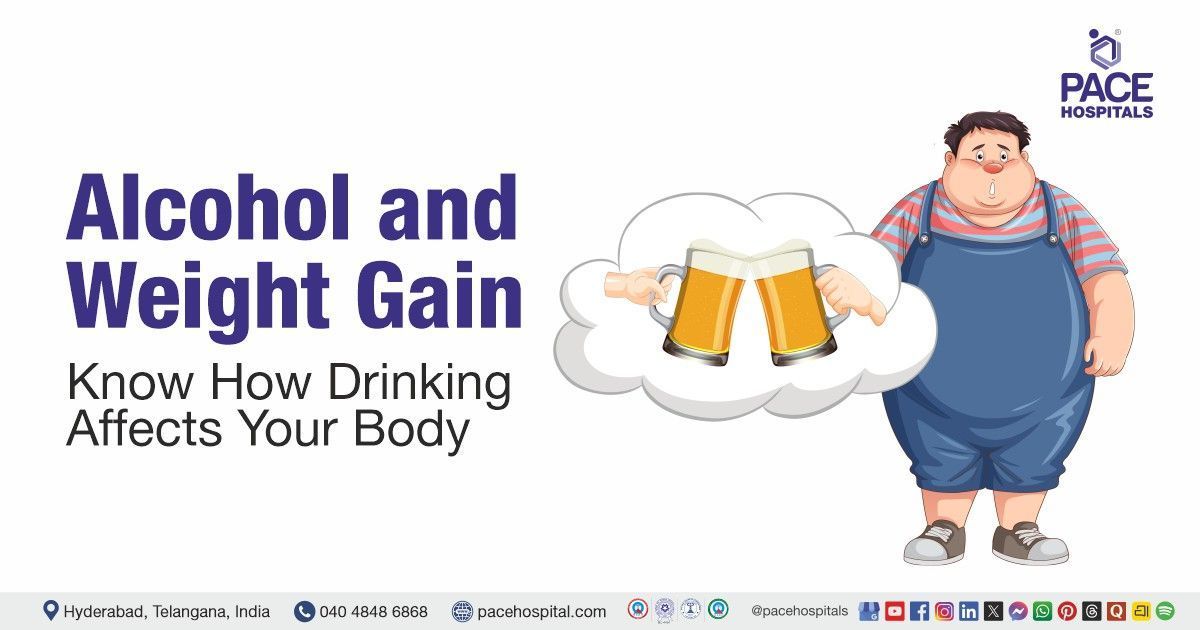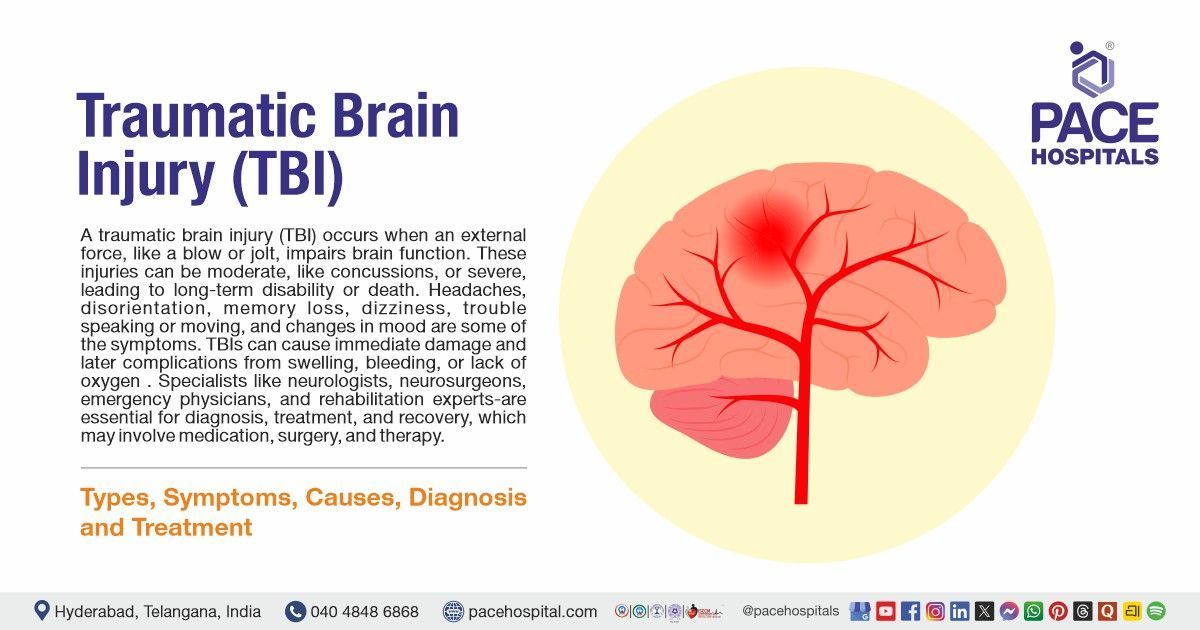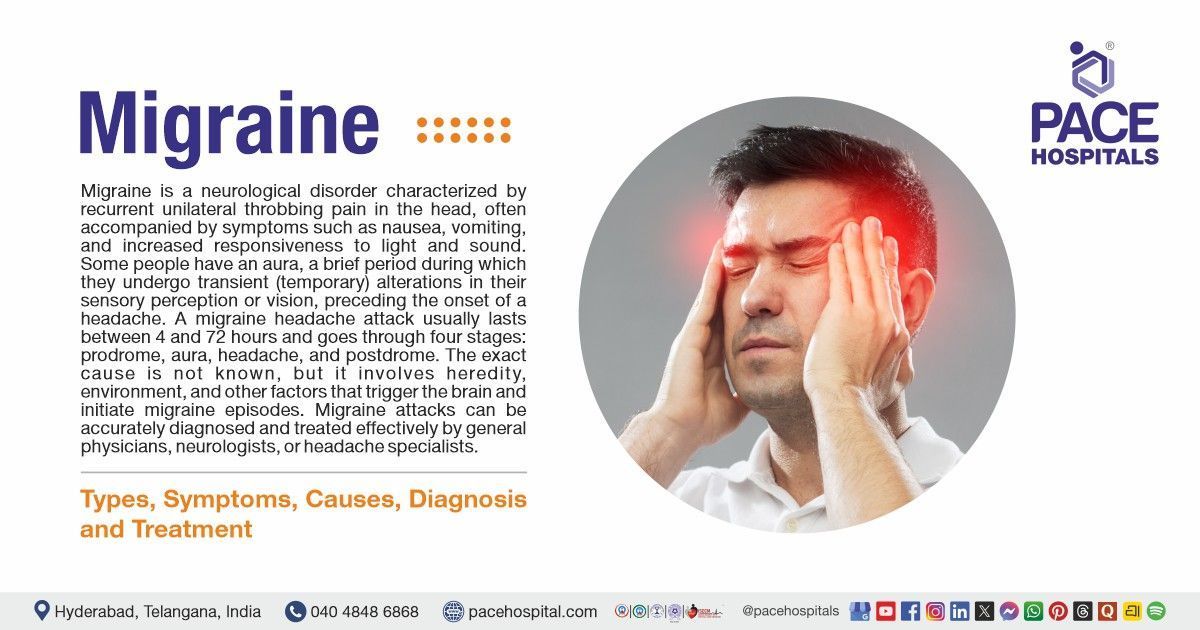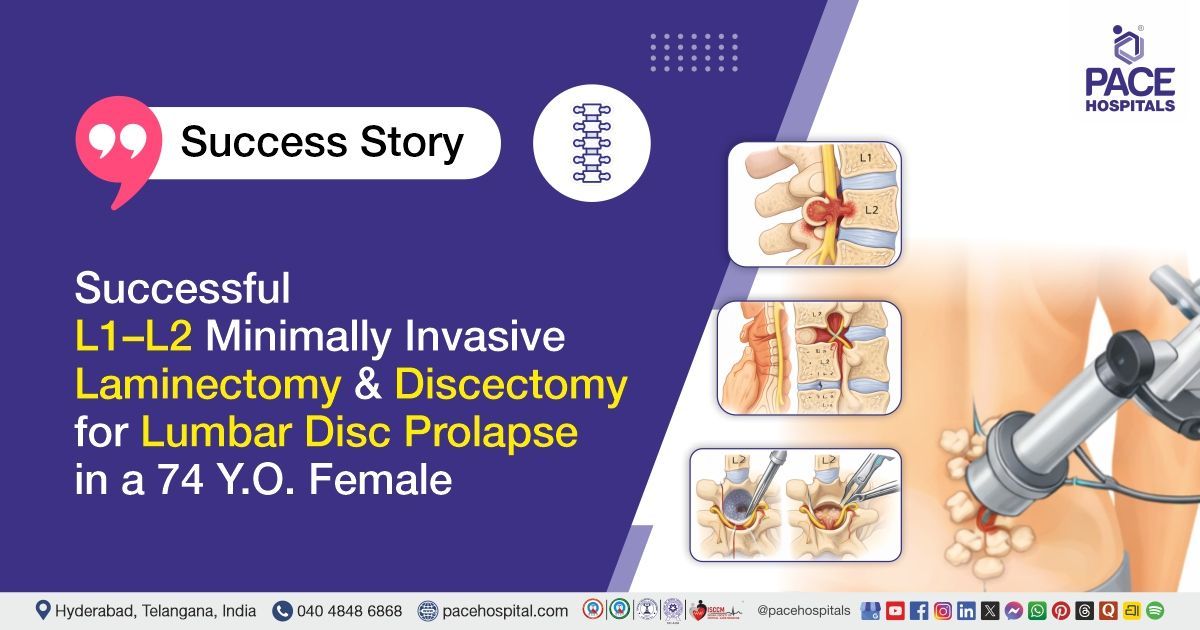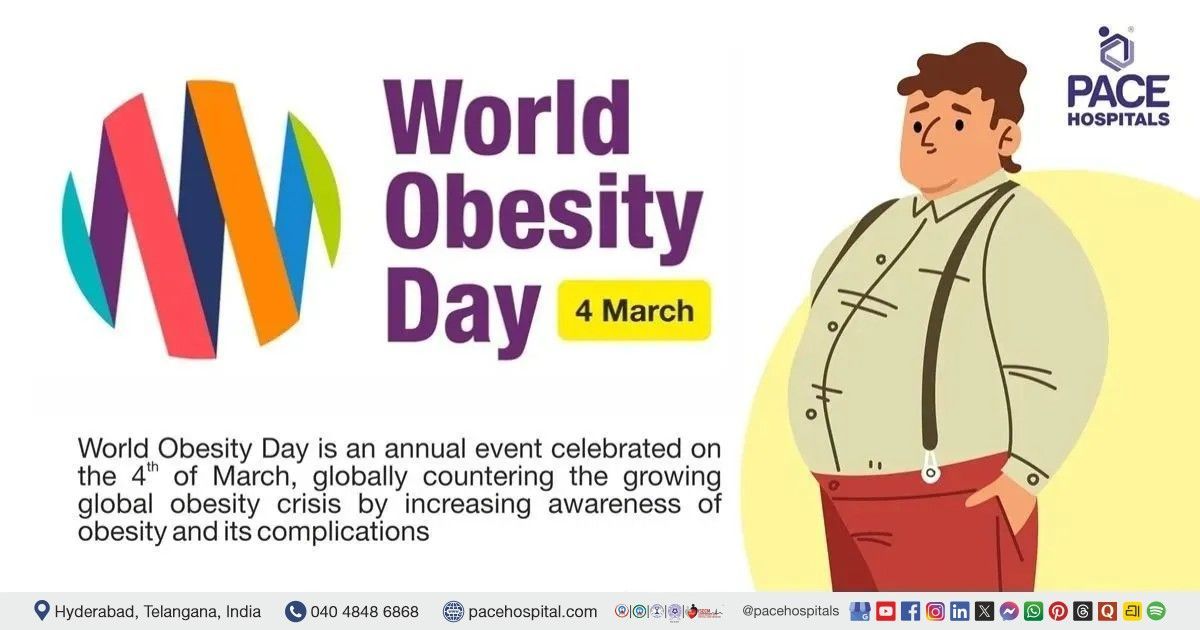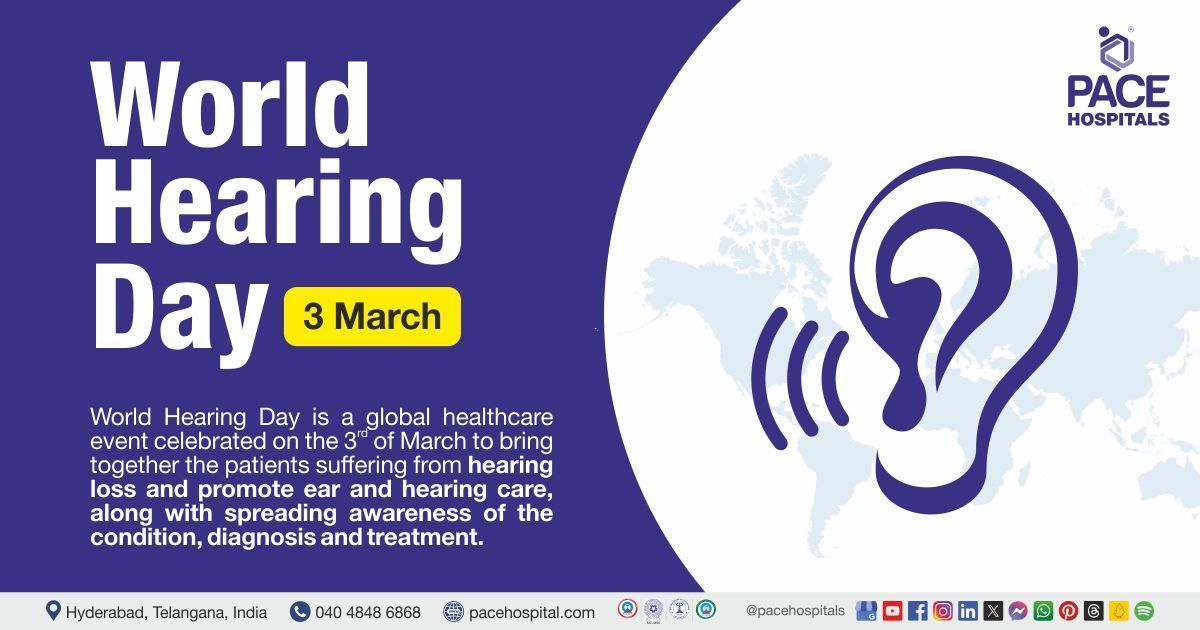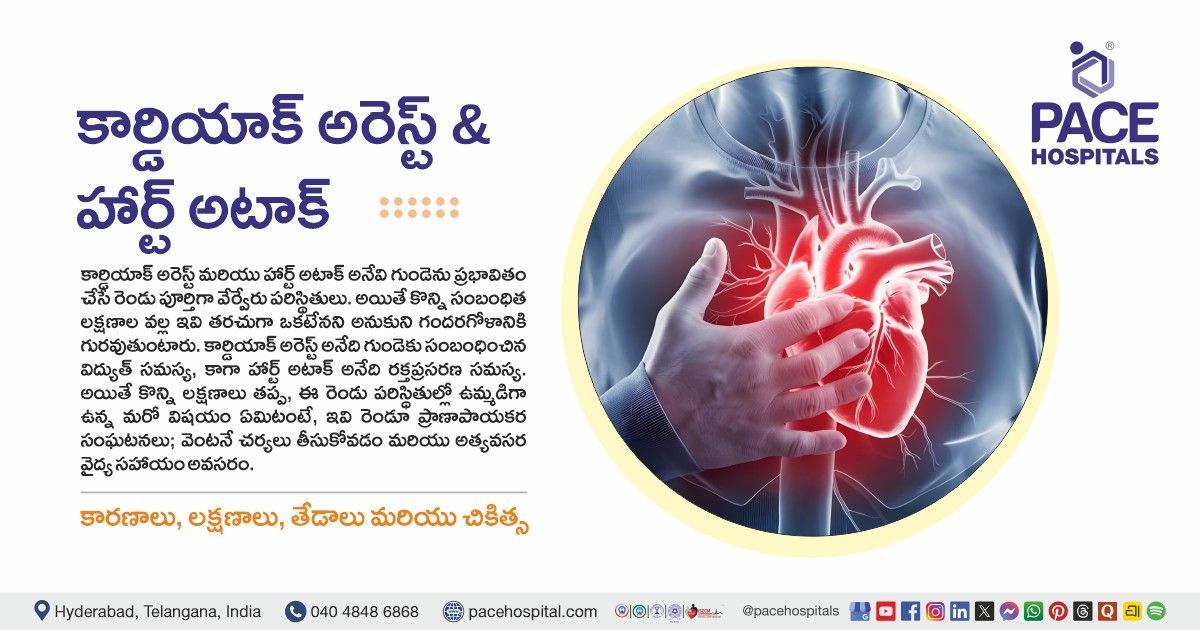Alcohol and Weight Gain – Know How Drinking Affects Your Body
PACE Hospitals
Written by: Editorial Team
Medically reviewed by: Dr. Suresh Kumar S - Surgical Gastroenterologist, Advance Laparoscopic & Liver Transplant Surgeon
Overview
Alcohol consumption is deeply rooted in many cultures, often associated with socializing or stress relief. Regular and excessive alcohol consumption can significantly contribute to weight gain and obesity, which increase the risk of liver disease, diabetes, heart disease, and several types of cancer.
At PACE Hospitals, Hyderabad, our gastroenterologists, hepatologists, and nutrition experts emphasize the connection between alcoholism and obesity — two conditions that frequently coexist and magnify each other’s harmful effects on the body.
Understanding how alcohol impacts metabolism, appetite, and fat storage is key to preventing long-term health complications.
How Alcohol Leads to Weight Gain and Obesity
High-Calorie Content in Alcohol
Alcohol contains empty calories — high in energy but devoid of essential nutrients.
- 1 gram of alcohol = 7 calories, nearly as much as fat (9 calories/g).
- A single pint of beer (~500 ml) contains about 200–250 calories.
- Cocktails, mixed drinks, and sugary liquors can exceed 300–500 calories per serving.
When these calories are consumed regularly, especially in addition to meals, the total energy intake quickly exceeds the body’s needs — resulting in fat accumulation.
Altered Fat Metabolism
When alcohol is consumed, your body prioritizes metabolizing ethanol over burning fat or carbohydrates.
This leads to:
- Reduced fat oxidation: Meaning the body stores more fat instead of burning it.
- fat accumulation in the liver: This can result in the development of fatty liver disease.
- Increased visceral fat around the abdomen, which is linked to metabolic syndrome.
At PACE Hospitals, hepatology specialists frequently observe that chronic alcohol consumers develop not only fatty liver but also central obesity, which further complicates liver and cardiovascular health.
Increased Appetite and Cravings
Alcohol stimulates appetite-regulating hormones and brain reward centers, making you crave salty, fatty, or sugary foods.
Drinking lowers inhibitions, leading to overeating or late-night snacking, especially of unhealthy foods like fried snacks, pizza, or fast food.
This behavior, combined with high-calorie alcohol, leads to significant weight gain over time.
Hormonal Disruption and Metabolic Effects
Chronic alcohol consumption disrupts hormones such as:
- Leptin (controls satiety) — lowered, leading to overeating.
- Cortisol (stress hormone) — increased, promoting fat storage.
- Insulin — resistance develops, causing elevated blood sugar and fat deposition.
Over time, these hormonal imbalances contribute to obesity, type 2 diabetes, and other metabolic disorders.
Poor Sleep and Reduced Physical Activity
- Excessive drinking leads to poor sleep quality, fatigue and dehydration, making people less active.
- Reduced physical activity slows metabolism and burns fewer calories, compounding the effects of excess calorie intake from alcohol.
Alcohol, Obesity, and Liver Health
Chronic alcohol consumption and obesity together form a serious combination for liver health. When combined, they can accelerate liver damage and increase the risk of developing:
- Alcoholic Fatty Liver Disease (AFLD)
- Non-Alcoholic Fatty Liver Disease (NAFLD)
- Liver fibrosis and cirrhosis
At PACE Hospitals, advanced liver diagnostics such as FibroScan, Liver Function Tests (LFTs), and Ultrasound Abdomen are used to determine the degree of liver damage to design personalized treatment approaches.
Other Health Consequences of Alcohol-Induced Obesity
- Heart Disease: High triglycerides and hypertension increase the risk of stroke and cardiac arrest.
- Diabetes: Alcohol interferes with glucose metabolism and promotes insulin resistance.
- Hormonal Imbalance: Affects estrogen and testosterone levels, leading to reproductive health issues.
- Sleep Apnea: Weight gain around the neck and abdomen causes breathing difficulties during sleep.
- Mental Health Issues: Alcohol dependency and body image stress increase anxiety and depression.
Can Weight Loss Reverse Alcohol-Induced Damage?
Yes — with timely intervention, much of the metabolic and hepatic damage caused by alcohol and obesity can be reversed.
PACE Hospitals’ multidisciplinary programs combine:
- Alcohol de-addiction counseling
- Nutritional therapy and low-calorie diet planning
- Liver detoxification and medical management
- Regular physical activity guidance
- Hormonal and metabolic monitoring
Even a 5–10% reduction in body weight significantly reduces the risk of liver and heart diseases.
Tips to Prevent Alcohol-Related Weight Gain
- Set weekly alcohol limits: Not more than 2–3 drinks per week.
- Alternate with water: Stay hydrated to avoid overconsumption.
- Avoid binge drinking.
- Eat before drinking: Reduces absorption and hunger spikes.
- Low-calorie beverages: Opt for lower-calorie options, include light beer, dry wine, or diluted spirits (in moderation).
- Exercise regularly: Incorporate 30–45 minutes of physical activity daily.
- Monitor your intake: Awareness prevents self-indulgence.
- Seek professional help: For issues related to dependency or obesity, talk to specialists.
Conclusion
Alcoholism not only harms your liver and heart but also plays a major role in causing obesity and metabolic disorders. Regular drinking introduces excess calories, slows fat metabolism, and disrupts hormones, leading to weight gain, fatty liver, and diabetes. The good news is that both conditions are preventable and reversible with the right guidance.
At PACE Hospitals, Hyderabad, our hepatologists, nutritionists, and de-addiction experts work together to help patients overcome alcohol dependency, manage obesity, and restore liver and metabolic health.
FAQs on How Alcoholism Contributes to Obesity
Does alcohol slow down metabolism?
Yes. The liver prioritizes breaking down alcohol over burning fat, slowing metabolism and promoting fat storage.
Does alcohol cause belly fat?
Yes. Alcohol promotes fat storage in the abdominal area due to hormonal imbalance and excess calorie intake, leading to "beer belly."
How does alcohol affect the liver and obesity together?
Both alcohol and obesity damage the liver, increasing the risk of fatty liver, cirrhosis, and metabolic syndrome.
What are the health risks of alcohol-induced obesity?
It increases the risk of fatty liver, diabetes, heart disease, stroke, infertility, and certain cancers.
Can alcoholism really cause obesity?
Yes. Alcohol contains high calories and disrupts metabolism, leading to fat accumulation and weight gain, especially around the abdomen.
How many calories are in alcohol?
Each gram of alcohol provides 7 calories. Beers, wines, and cocktails can add 150–400 calories per drink, leading to calorie surplus and obesity.
Why does alcohol increase appetite?
Alcohol stimulates appetite hormones and lowers inhibitions, making people crave high-fat and high-sugar foods.
Can I lose weight if I stop drinking alcohol?
Absolutely. Quitting alcohol helps the body burn fat efficiently, reduces cravings, and leads to noticeable weight loss within weeks.
Are some alcoholic drinks less fattening than others?
Light beers, dry wines, and diluted spirits have fewer calories than cocktails or sugary mixers, but moderation is still key.
Where can I get treatment for alcohol-related obesity in Hyderabad?
You can consult hepatology and de-addiction specialists at PACE Hospitals, Hyderabad. Book your appointment online at https://book.pacehospital.com/ or call +91 40 4848 6868.
Share on
Request an appointment
Fill in the appointment form or call us instantly to book a confirmed appointment with our super specialist at 04048486868

